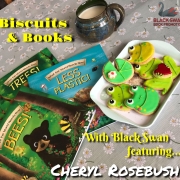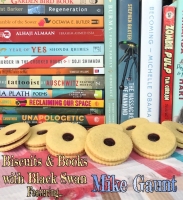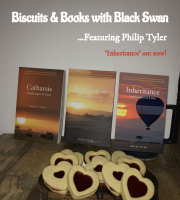Biscuits & Books with Black Swan 07 – Cheryl Rosebush
Cheryl Rosebush is author to a series of children books, ‘What The World Needs Now’, which aims to enlighten its young readers on environmental issues and even what they can do to help. They inform children, initially with their titles, that the environment is in need of ‘Trees’, ‘Bees’ and ‘Less Plastic’. I must admit that even I, as an adult, have these books on my bookshelf as they’re just so charming! I was really excited to talk to Cheryl about her books that serve such an important purpose.
BSBP: Hi Cheryl, it goes without saying how important it is for children to learn about environmental issues, what made you get involved in this education? And what made you get involved through writing these books?
CR: (I actually wrote a blog on this exact question! Below is an excerpt from that piece):
“After 10+ years of writing about sustainability and climate change issues for governments, international organizations and the private sector, I felt it was time to add a new audience to my repertoire. And being a mom to two curious young boys over the past eight years has given me daily practice in explaining my work and why it’s important.
But if I had to pinpoint my proverbial “light bulb” moment for developing my book series, it was probably when my oldest was about 3 or 4 years old. At the grocery store, I was explaining to him why I wouldn’t buy him a cheap, plastic toy (“…because it will break, end up in the garbage, and maybe end up in the ocean where a whale might think it’s food, and eat it. And that would make the whale sick.”).
What amazed me is how easily he followed the logic. He just got it. And I realized then that we shouldn’t be waiting to talk to young kids about our environmental challenges. The trick was finding the right starting point for ages 4-8, and that is what my series is designed to do– to give parents the right entry point to these conversations, on which future learning can build.”
Here’s the link to a video I produced that explains my “why” for creating the series.
BSBP: We’ve met Melly the Black Bear, Jefri the Orangutan and Kalea the Green Sea Turtle. How did you create these characters? I think your young readers will find them cute and really root for them – even more incentive for them to look after the environment they live in.
CR: The common denominator in all the central characters in my series “What the World Needs Now” is that these creatures are among those that have the most at stake (ie. the most to lose) with the environmental challenge presented in each book.
For example, the first book in the series is about the importance of trees, and after my World Bank mission to Sumatra in 2019, I knew I wanted my main character to be an orangutan. They literally have everything to lose by tropical forest loss. And since they share so many similarities to humans, I thought an orangutan would be the perfect animal to underscore the ways in which we are all connected to trees.
In “Bees!“, Melly would surely run out of food to eat without the tireless work of her forest’s busy, busy bees. And in “Less Plastic!“, our young sea turtle Kalea is particularly affected by the translucent plastic bags floating in her waters that look a lot like the jellyfish she likes to eat.
BSBP: The stories include multiple, clear directions on how people can help the environment. If you had to give just three top tips to being more environmentally friendly, what would they be?
CR: If we all got out of the bad habit of consuming as much as we do (especially from places halfway around the world from us!), that would go a LONG way to solving some of our biggest environmental challenges. It would help to decrease transportation emissions; decrease waste that ends up in dumps and pollutes our land and water; decrease the pressures on natural resources. The reality is that well-intentioned recycling programs around the world have just not delivered the waste reduction they promised. Reducing and reusing remain the two most important “Rs” we can work toward.
BSBP: The physical print books themselves are also eco-friendly, which you’d never guess just by feeling them, they’re such good quality. What advice can you give to publishers in making sure their releases are not bad for the environment?
CR: There are several things publishers can seek out to produce eco-friendly books. I am proud to say that all of the books in the What the World Needs Now series adhere to the highest standards of eco-printing, using: 100% recycled paper, biodegradable lamination, vegetable-based inks and carbon-balanced printing in the UK, through the World Land Trust. Adhering to these eco-standards means my books aren’t the least expensive ones you could produce, but they are books publishers can feel good about producing (and customers can feel good about buying!). You can read more about eco-printing in the blog from my amazing UK printer, Dynamic Impressions.
BSBP: Your writing may be the first introduction children have to exploring these issues. I can really imagine these books sparking a child’s interest in a career in environmental conservation. What message would you give to these kids?
CR: We need you! One of the greatest injustices of our time is that kids are inheriting a mess they played no role in creating. But I would urge them to push past this, and join the millions of passionate people around the world who are changing things for the better. And when they feel despair or anxiety about our environmental challenges, I would suggest to them that hope is earned– the more action we take, the more hope we feel.
BSBP: I love the activity page at the end of each book, in fact I find myself holding back from picking up my own colouring pencils and having a go! I suppose this isn’t much of a question, but thank you for thoughtfully creating these books in a way that children will really personalise and engage with them.
CR: Thanks, that’s sweet! I included those colouring pages quite simply because I saw how much my boys loved them in other books we have. Same for the little “sidekick” hidden in every spread. My kids still love being the first to find them!
BSBP: Can we look forward to new members of Melly, Kalea and Jefri’s squad?
CR: It is absolutely my intention to add to the series, including translating my books into other languages. The learning curve is steep in the world of self-publishing, and I have learned that creating and selling books is not the easiest process (especially when they are eco-friendly books NOT printed in China!). Having said that, I do sincerely hope to produce more, when I can find the right partner(s) to help me make that happen.
BSBP: You were able to secure some impressive book endorsements, including from conservation legend Dr. Jane Goodall. As a first-time, self-published author, how did you go about getting those?
CR: One of the most encouraging parts of my publishing journey so far has been the incredible endorsements that have come in for the first three books in my environmental children’s series. My process started with the attitude that it’s free to ask (so go ahead and think big!). The second part was working that six-degrees-of-separation principle (i.e. everyone knows someone who knows someone…). These days, networking platforms like LinkedIn, along with Facebook and Instagram have brought that six degrees down to about 1-2 in many cases. And never underestimate the power of connecting and building relationships with gatekeepers — executive assistants rule the world!
When I got the email with Dr. Goodall’s book endorsement in September 2020, I remember writing online, “The best thing that could possibly happen with my first book just happened.” And that about sums it up. There is no bigger name or hero in the world of nature conservation.
Also from the UK, Gill Perkins, CEO of the Bumblebee Conservation Trust, kindly offered a lovely endorsement of my “Bees!” book. And for my third book “Less Plastic!”, two great endorsements came in: one from Doug Allan, Award-winning BBC, Discovery and National Geographic cameraman,and Marine Conservation Society Ambassador, who worked for years alongside Sir David Attenborough; and Natalie Fée, Founder of the UK’s City to Sea clean water initiative, and author of “How to Save the World for Free“.
Some of my book endorsements came through within days or weeks; others took months. And it should be said that some never came through at all. Like everything else about making books, it takes time and energy to secure strong endorsements. But if/when they finally come in,
they are yours forever.
More on this in my blog on book endorsements
Thank you to Cheryl for her time being part of this interview… go check out her work at https://www.ypdbooks.com/771_cheryl-rosebush and her website at https://www.cherylrosebush.com/




Leave a Reply
Want to join the discussion?Feel free to contribute!